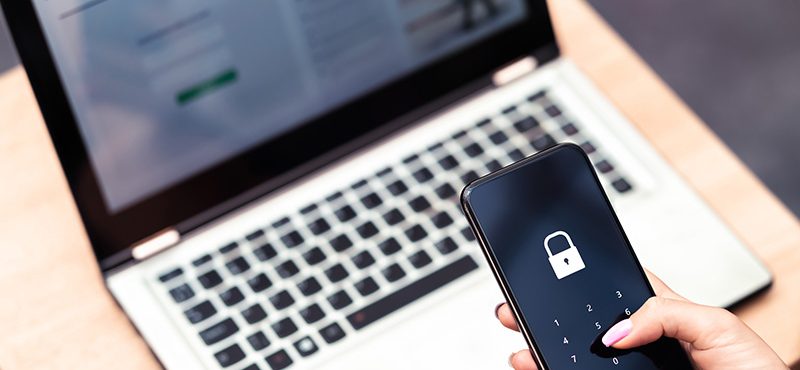In today’s digital age, we’re more connected than ever, but that also means we’re more vulnerable to cyber threats.
This Cybersecurity Awareness Month, it’s crucial to reflect on how to safeguard ourselves and our loved ones in the ever-evolving landscape of online security.
Why it matters: You might think that cybercriminals primarily target big corporations, but the truth is everyone is at risk. Shockingly, nearly half of American adults have had their personal information exposed by cybercriminals.
To help you stay safe in the digital world, we’re sharing four cybersecurity tips in honor of Cybersecurity Awareness Month.
1. Create Strong Passwords
It may sound like a no-brainer, but creating strong passwords is critical to protecting yourself from cyber threats.
While we hope you’ve progressed beyond using “123456” or your birthdate as passwords, it’s worth noting that hackers have become more sophisticated over the years, making it even more important to create complex passwords.
Remember that your password should be:
- Long: At least 16 characters long.
- Random: Use a random string of letters (upper and lowercase), numbers, and symbols (like, !?,>). OR create a memorable phrase of 5-7 unrelated words (like LemonShoeForkBike).
- Unique: Use a different strong password for each of your accounts. Otherwise, a successful hack could lead to “credential stuffing,” where one hacked password is used to enter other accounts.
The good news is that if you follow these guidelines, you won’t need to change your passwords frequently. That is, unless you suspect unauthorized access or a data breach.
Bonus: If available, using multi-factor authentication can make it even harder for someone to compromise your account.
2. Use a Password Manager
So, the next question is: how can you remember and keep track of your long and unique passwords?
Ditch that Word doc, spreadsheet, or notebook and instead use one of the many free and easy-to-use tools that help manage your library of unique passwords.
The details: Password mangers which often come in the form of apps or browser plugins, can store and encrypt your passwords. They also alert you to weak or re-used passwords, generate strong passwords, and autofill them when you arrive at a website.
Many of the most common programs you use every day – including Google and iCloud – offer them free of charge.
The best part: You only need to remember one password – the master key that grants access to your password manager.
3. Be Suspicious of Unexpected Emails or Text Messages
Cybercriminals use emails or text messages to trick you into giving them your personal and financial information. This type of communication – phishing – is a popular form of cybercrime that is incredibly effective.
The good news is that you can avoid taking the bait by following these steps.
Recognize: The best way to protect yourself from phishing scams is to know what to look for – including:
- Requests for you to send personal and financial information
- Urgent or emotionally appealing language, especially messages that threaten dire consequences for not acting immediately
- Untrusted shortened URLs
- Incorrect email addresses or links, like amazan.com
Resist: If you suspect phishing, resist the temptation to click on links or attachments that seem too good to be true, as they may be trying to access your personal information.
Delete: Delete the message. Don’t reply or click on any attachments or links, including “unsubscribe” links.
Report a scam message by forwarding it to SPAM (7726) or at the Federal Trade Communications website here.
4. Update Your Software
We get it! Sometimes, you’re in the middle of something and don’t have time to update your software. Or you receive so many messages about it that you ignore them. But their importance cannot be overstated.
The details: Manufacturers issue updates as they discover new product vulnerabilities. Only apply updates from manufacturer websites and built-in application stores, as third-party sources can be unreliable and may expose your devices.
To avoid interrupting your online activities, schedule updates at night or allow your operating system to perform automatic updates when it notices that usage levels are low.
Practicing Cybersecurity “Hygiene”
In 2022, the FBI received over 800,000 complaints of suspected cybercrime, with reported losses exceeding $10.3 billion.
The message is clear: following these four cybersecurity tips is no longer optional. Just as we prioritize personal hygiene – like bathing or brushing your teeth – safeguarding your digital well-being can help save you from identity theft, loss of money or time, or even worse.
At Beyond, we’re committed to helping consumers stay informed and secure online. To learn even more cybersecurity tips, including how to practice two-factor authentication, read our related article here.
